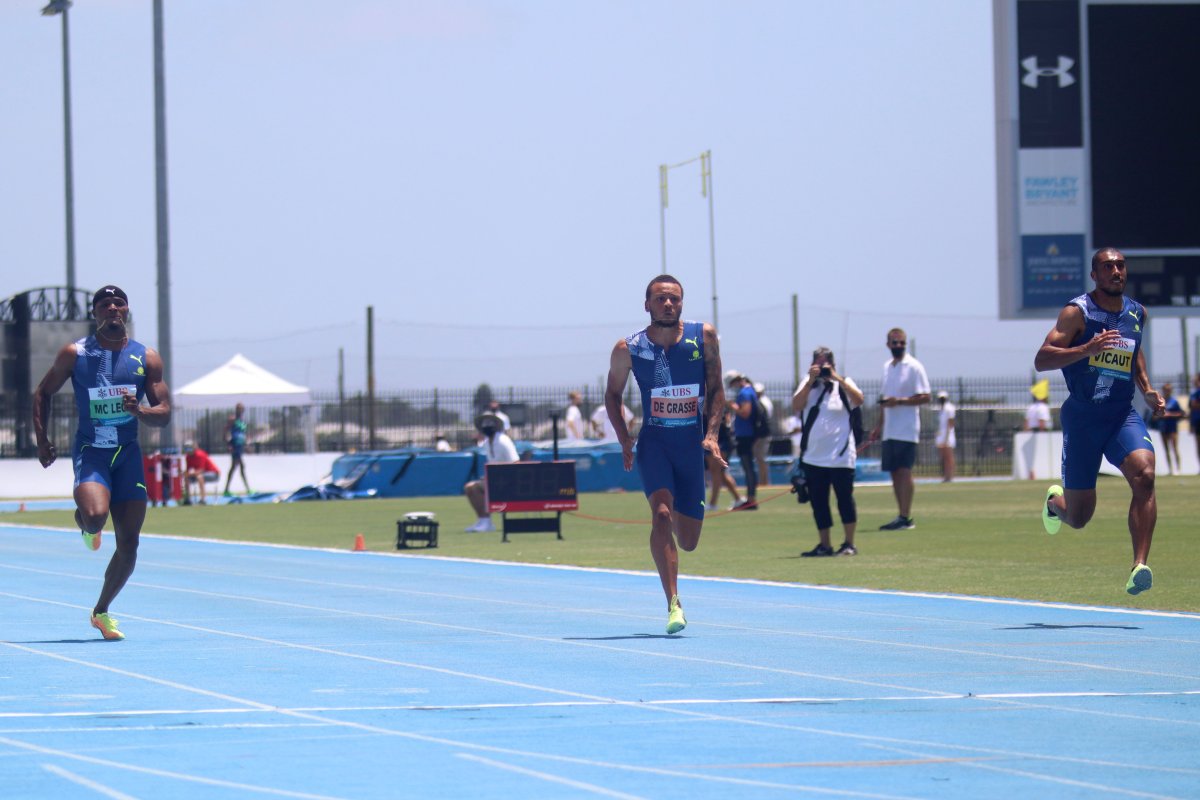Amid the ongoing global coronavirus pandemic, the opening of a track and field event in Switzerland this week started with a disclaimer.

Welcoming viewers to the broadcast of the Weltklasse Zürich Thursday, commentator Steve Cram explained organizers were trying something new — and complicated.
“It’s different,” Cram said. “It’s a challenge. Bear with us.”
Rather than cancel the 2020 edition of the 90-year-old event due to the global pandemic, organizers brought athletes together in a sort of virtual competition.
The event was hosted out of Switzerland, but competitors were in seven cities around the world.
“The athletes cannot come to Zürich,” said Christophe Joho, one of the meet’s directors, “so we decided to go to them.”
Thirty athletes took part in the by-invitation eight-event competition. In addition to Zürich, there were participants in stadiums in the U.S. (California and Florida), Portugal, France, The Netherlands and Sweden.
The athletes were in different cities, but competed against each other. In the racing events, a signal was sent out and the runners started together.
After the race, the feeds were collected and edited together to show each competitor in boxes side-by-side. It meant a delay of about two minutes before anyone knew who had won.
In events like the long jump, competitors took their turn, and then followed the competition on computers or phones.
The athletes admitted it was far from a regular meet, but were still happy to have the chance to measure themselves against opponents.
“There’s something about knowing you’re in a competition,” said American pole vaulter Sandi Morris. “There’s nothing that can replace that, and the adrenaline you get.”

Canada’s Andre de Grasse ran the 100-yard dash in Brandenton, Fla. The sprinter won three medals in the 2016 Olympic Games, but with the 2020 Games on hold, has struggled to find opportunities to train — much less compete.
“It’s been really tough,” de Grasse said after winning his race. “We’ve only been training two or three times a week. We’ve been trying to bounce from track to track, and getting kicked off here and there.”
American sprinter Allyson Felix says she, too, has had to be creative — and somewhat sneaky — with her training in California. The facilities she’d normally be using are closed.
“Everything is still pretty much locked down,” Felix said. “You can’t get onto a track without jumping a fence.”
The actual results were less important than the fact the event took place at all. With track events being cancelled around the world, a sport that already struggles for attention is taking a hit.
Montreal sports economist Moshe Lander says the Zürich even may have come off as a gimmick, but it may have been a matter of survival.
- Life in the forest: How Stanley Park’s longest resident survived a changing landscape
- ‘Love at first sight’: Snow leopard at Toronto Zoo pregnant for 1st time
- Buzz kill? Gen Z less interested in coffee than older Canadians, survey shows
- Carbon rebate labelling in bank deposits fuelling confusion, minister says
“If you go missing a year, think of the damage that could be done to what minimal branding they already have,” Lander says.
Despite the considerable technical challenges holding the event, the only major problem was a single case of human error.
For a time, it appeared American sprinter Noah Lyles had set a new world record in the 200 meters. His posted time of 18.90 would beat Usain Bolt’s long-standing record of 19.19 set in 2009.
“That cannot be right!” exclaimed an exasperated Cram. “That cannot be right! Can it?”
No, it cannot. As it turned out, the starting blocks in Florida had been set up at the wrong line, and Lyles had only run 185 meters.
He was disqualified.







Comments